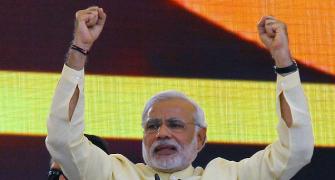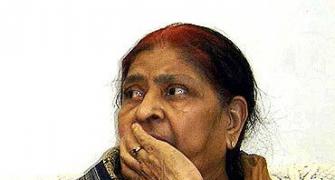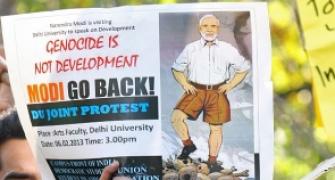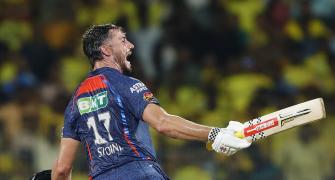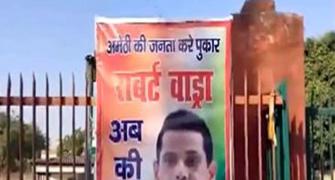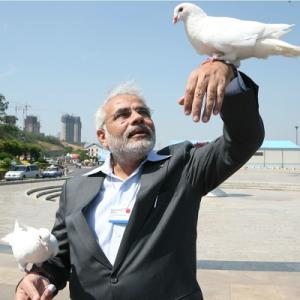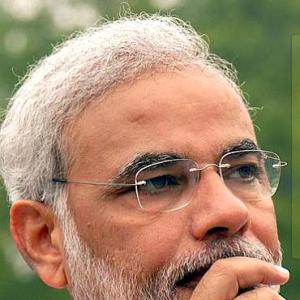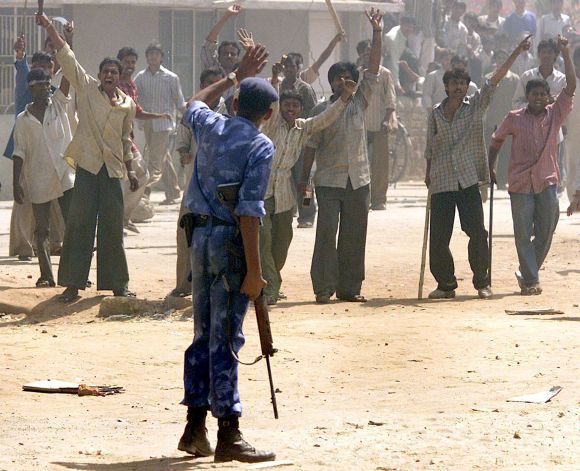
'I don't think there is a need to order a fresh investigation into the complaint against Modi & Co. As the amicus curiae Raju Ramachandran said in his report to the Supreme Court, the existing material is more than sufficient to prosecute Modi and other high-ups of his regime,' Manoj Mitta, author of the book The Fiction Of Fact-Finding: Modi and Godhra tells Rediff.com's Prasanna D Zore.
In his recent interview to ANI, Gujarat Chief Minister Narendra Modi claimed that there is not 'even a grain of truth' in the allegations leveled against him for his role in the post Godhra riots of February-March 2002.
Senior journalist Manoj Mitta's book The Fiction Of Fact-Finding: Modi and Godhra makes a serious, sincere and scholarly attempt to ferret out the gaps in the Supreme Court-appointed Special Investigation Team that, Mitta feels, "was far from effective", resulting in Modi getting off the hook for his alleged complicity in the Gujarat riots of 2002.
Mitta's book argues that the SIT was not sincere enough to get to the bottom of the matter, but avers 'the existing material is more than sufficient to prosecute Modi and other high-ups of his regime'.
"Had the SIT not balked at asking questions on issues of far greater consequence, Modi would have most likely been facing a trial, as recommended by another Supreme Court appointee, amicus curiae Raju Ramachandran," says Mitta.
In this candid interview with Rediff.com's Prasanna D Zore over e-mail, Mitta answers a range of questions surrounding the SIT investigation and his hopes that the Gujarat high court or the Supreme Court "will make amends and reject the SIT's finding that there was not enough prosecutable evidence against Modi and others."
"In the prevailing political environment, the independence of the judiciary will be tested more than ever before," believes Mitta, a senior editor at The Times of India.
What leads you to write such diligently researched books that take on the might of the establishment?
First, it was When a Tree Shook Delhi that exposed the lame fact-finding techniques that various inquiry commissions employed to protect powerful Congress politicians involved in the anti-Sikh carnage that followed then prime minister Indira Gandhi's assassination, and now with The Fiction Of Fact-Finding: Modi and Godhra that exposes similar attempts by the Special Investigation Team that let Modi get away?
Both books grew organically from my journalistic engagement with the process of fact-finding. The engagement was deep and sustained.
My concern though was not only with the mass crimes that had been committed in 1984 and 2002. Nor was I content with just grasping the findings handed by various state agencies.
My priority has actually been on tracking how exactly those conclusions had been arrived at, whether the findings really matched the testimonies and other evidence recorded by those very courts and commissions.
As a human rights journalist, I have strived to expose impunity and institutional bias, the dirty tricks played by police and judicial authorities to shield the political and administrative high-ups accountable for the mass crimes.
Did you receive any threats from people who thought these books could harm careers?
No, I have not received any threats. After the publication of the Gujarat book (The Fiction Of Fact-Finding: Modi and Godhra), I did face hostility, though it was not from any of the persons directly accountable for the violence or the cover-up.
Do you think the SIT deliberately let Modi off the hook by not asking him questions that could have possibly nailed his complicity in the riots?
The gaps and contradictions in the SIT report pointed out by my book do establish that this Supreme Court-appointed team deliberately let Modi off the hook.
The deficiencies in the investigation were most glaring in the SIT's failure to ask obvious follow-up questions.
The SIT refrained from pinning him down on any of the dodgy claims made by Modi when his testimony was recorded in 2010.
Take his claim on the very first post Godhra massacre, which took place at Gulberg Society in Ahmedabad on February 28, 2002. Though the massacre had been all over by 3.45 pm, Modi claimed that he had come to know of it only after 8.30 pm, which was a gap of five hours.
The SIT did not challenge this incongruity despite recording a list of meetings Modi had held with police officers through the day, apparently to track the violence real time as he was both the chief minister and home minister of Gujarat.
What purpose would you ascribe to the SIT letting Narendra Modi get away?
The book dwells on the controversies related to the flawed composition of the SIT, beginning with the unsuitability of R K Raghavan as its chairman.
One of the biggest revelations made by the book is, in fact, about Raghavan's own indictment for the security lapses leading to Rajiv Gandhi's assassination in 1991.
But as this indictment had glossed over the gravity of the evidence on record, it allowed the Vajpayee government to resurrect his career in 1999 when he was given the coveted post of CBI director.
This in turn paved the way for the crucial post-retirement assignment from the Supreme Court entrusting Gujarat carnage cases to him.
Are you suggesting through the title of your Gujarat book that the entire fact-finding conducted by the SIT under the leadership of its chairman R K Raghavan was a sham?
The Supreme Court's intervention in Gujarat 2002 (investigations by appointing the SIT) made a dent in India's record of impunity in communal violence cases. It led to convictions in some of the most egregious cases, most notably being of Modi's minister Maya Kodnani for her complicity in the Naroda Patiya massacre.
But when it came to the complaint directly related to Modi, along with 60 others of his regime for the entire Gujarat carnage, the Supreme Court's monitoring of the SIT investigation proved to be far from effective.
The saving grace is that it yielded rich material laying bare, however unwittingly, despite the lengths to which the SIT had gone to shield Modi.
The oxymoronic title of my book is indeed inspired by the travesty of fact-finding on Zakia Jafri's complaint.
Modi recently reiterated in an interview to ANI that there was 'no grain of truth' in the allegations about his complicity in the post Godhra riots?
He also admitted in that interview that he had stopped taking questions from the media about the riots way back in 2007.
This is disingenuous because, in the wake of all the details that have come to light through the SIT investigation, Modi has much more to explain now than ever before.
The recording of his testimony put him on the spot on why he had not intervened in the Gulberg Society massacre and why in his address to Doordarshan the same evening he had denounced only the Muslim perpetrators of Godhra and not the Hindu perpetrators of post Godhra violence.
Hence his claim to the SIT that, despite the succession of meetings he had held with the police, he had no clue to the massacre of 69 Muslims in Gulberg Society for as long as five hours.
My book has brought out several such implausible claims which he would be hard-pressed to justify.
In what way would you say the hushing up of Rajiv Gandhi's or his government's complicity in the 1984 anti-Sikh carnage different from the SIT's hushing up of facts to protect Narendra Modi's complicity in the massacres that took place in Gujarat in the wake of the burning of the Sabarmati Express?
The cover-up of political and State complicity in the 1984 carnage was even more blatant. Back then, the notion of accountability was much less developed.
The NHRC (National Human Rights Commission), which served as a catalyst in dealing with the 2002 carnage, had come into existence nine years after the 1984 massacre.
Luckily for Rajiv Gandhi, the judicial activism had not evolved enough yet for the Supreme Court to intervene in politically motivated mass crimes.
What could be the ten most crucial questions (or for that matter any number of questions) you would have asked -- which you say in your book that the Supreme Court-appointed SIT did not -- the Gujarat chief minister if you were in place of SIT chief R K Raghavan?
Listing out the questions that had been deliberately left out by the SIT would make little sense without going into the context of each of them.
In my book, you will find both the questions and their context. And in this interview, I have already cited the example of unasked questions in the context of the Gulberg Society massacre.
Such follow-up questions could have pinned down Modi, much in the manner in which he had recently been forced by a tightening of the electoral system to admit for the first time that he had a wife.
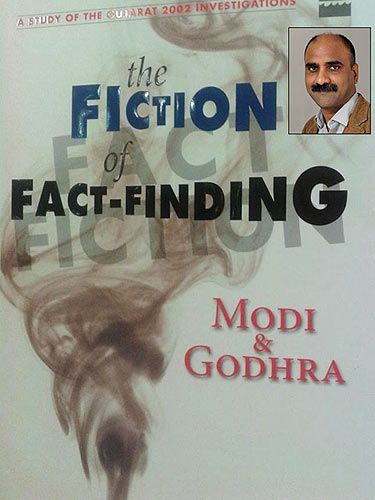
Had the SIT not balked at asking questions on issues of far greater consequence, Modi would have most likely been facing a trial, as recommended by another Supreme Court appointee, amicus curiae Raju Ramachandran.
Now, that the SIT as well as a magisterial court in Ahmedabad has given a clean chit to Narendra Modi, what legal recourse do Zakia Jafri and all those wanting to prove Narendra Modi and his government's complicity in the post Godhra massacres have, apart from appealing against the magistrate's order in a higher court?
The matter is now before the Gujarat high court.
Given the wide range of unasked questions and the wealth of material on record, I hope that the high court or at least the Supreme Court will make amends and reject the SIT's finding that there was not enough prosecutable evidence against Modi and others.
In the prevailing political environment, the independence of the judiciary will be tested more than ever before.
Is there a legal provision in the Constitution by which the entire fact-finding exercise conducted into the post-Godhra killings can be redone and Narendra Modi summoned again by a new investigation team?
I don't think there is a need to order a fresh investigation into the complaint against Modi & Co.
As Ramachandran said in his report to the Supreme Court, the existing material is more than sufficient to prosecute Modi and other high-ups of his regime.
Could the Supreme Court have perhaps forced the SIT to ask questions that mattered?
When a bench headed by Justice Arijit Pasayat referred Zakia Jafri's complaint to the SIT in April 2009, it appeared to have pushed the envelope of accountability as Accused No 1 named by the complainant (Zakia Jafri) was none other than Chief Minister Narendra Modi.
This expectation of accountability was, however, belied by the subsequent bench headed by Justice D K Jain as it proved to be lax in various ways in its monitoring of the SIT investigation.
The final nail in the coffin was the Supreme Court's sudden decision in September 2011 to cease the monitoring of the investigation, thereby emboldening the SIT to ride roughshod over Ramachandran's recommendation to initiate criminal proceedings against Modi and others.
Do you fear the establishment will hound you -- as you have mentioned in the book that your e-mail was hacked into and the SIT's closure report alleged that you helped IPS officer Sanjiv Bhatt in filing an affidavit in court against the Gujarat chief minister -- if Narendra Modi were to become India's prime minister?
Well, any attempt to hound me would be an opportunity for me to question the veracity of the SIT's observation against me.
For, the very e-mail annexed by the SIT shows that when Bhatt had sent me his draft affidavit, the only addition I suggested was all of one sentence, explaining his compulsion for approaching the Supreme Court.
Yet, in a bid to malign an independent journalist breathing down its neck, the SIT claimed that I had advised Bhatt 'to incorporate a few more paragraphs drafted' by me.
This distortion by the SIT has been picked up by Modi trolls to divert attention from the issues raised by my book.
Main Image: An RAF trooper confronts rioters during the Gujarat riots in 2002. Photograph: Arko Datta/Reuters. Below: The cover of The Fiction Of Fact-Finding: Modi and Godhra. Inset: Author Manoj Mitta
You can buy The Fiction Of Fact-Finding: Modi and Godhra here.

